Women in STEM Resource List
“Look at the talent of these women. This is what you lose when you do not solve this problem. It's true not just of women, it's true of minorities, it's true of all groups that get excluded. It's all of that talent that you lose. For me, the success of these women is the reward for the work we did. That's really what it's about. It's about the science.” -Nancy Hopkins, professor emerita of biology at MIT
Suggested Articles
- Climate change: An Increase in Norms for Inclusion Predicts Greater Fit and Commitment for Women in STEM by William Hall, Toni Schmader, Michelle Inness, and Elizabeth Croft (2022) (requires login)
- Trends in the Representation of Women Among US Geoscience Faculty From 1999 to 2020: The Long Road Toward Gender Parity by Meghana Ranganathan, Ellen Lalk, Lyssa M. Freese, Mara A. Freilich, Julia Wilcots, Margaret L. Duffy, and Rohini Shivamoggi (2021)
- Too Intelligent for the Life Sciences in Brazil : How Two Female Researchers Fought Back by Luciana Leite and Luisa M. Diele-Viegas (2020) (requires login)
- In Their Own Words: Women Doing NOAA's Work by NOAA Women's Employee Resource Group (2020)
- Advancing Women of Color in STEM : An Imperative for U.S. Global Competitiveness by Mary V. Alfred, Sarah M. Ray, and Michele A. Johnson (2018) (requires login)
- The Changing Career Trajectories of New Parents in STEM by Erin A. Cech and Mary Blair-Loy (2019) (requires login)
Suggested Books
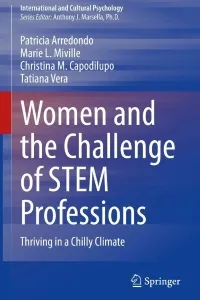
Women and the Challenge of STEM Professions: Thriving in a Chilly Climate by Patricia Arredondo, Marie L. Miville, Christina M. Capodilupo, and Tatiana Vera (2022) (requires login)
"A comprehensive and detailed analysis of the landscape for women in STEM careers. The best part, though, is that they also talk about best practices for women on how to thrive in those environments, including chapters on how to find support, how to self-advocate, how to resist structural barriers. But, because they take a structural approach, they also end with recommendations for leaders in the academy to retain women in STEM departments."
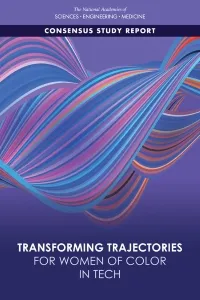
Transforming Trajectories for Women of Color in Tech edited by Evelynn Hammonds, Valerie Taylor, and Rebekah Hutton (2022)
"...uses current research as well as information obtained through four public information-gathering workshops to provide recommendations to a broad set of stakeholders within the tech ecosystem for increasing recruitment, retention, and advancement of women of color."
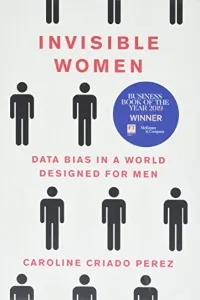
Invisible Women: Data Bias in a World Designed for Men by Caroline Criado Perez (2019)
"...an impressive range of case studies, stories and new research from across the world that illustrate the hidden ways in which women are excluded from the very building blocks of the world we live in, and the impact this has on their health and wellbeing. From government policy and medical research, to technology, workplaces, urban planning and the media – Invisible Women reveals the biased data that excludes women. In making the case for change, this powerful and provocative book will make you see the world anew."
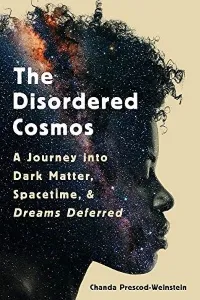
The Disordered Cosmos: A Journey into Dark Matter, Spacetime, and Dreams Deferred by Prescod-Weinstein, Chanda (2021)
"Dr. Chanda Prescod-Weinstein's vision of the cosmos is vibrant, inclusive and buoyantly non-traditional. As she makes clear, what we know about the universe won't be complete until we learn to think beyond the limitations of white-dominated science. Science, like most fields, is set up for men to succeed, and is rife with racism, sexism, and shortsightedness as a result. But as Prescod-Weinstein makes brilliantly clear, we all have a right to know the night sky. By welcoming the insights of those who have been left out for too long, we expand our understanding of the universe and our place in it."
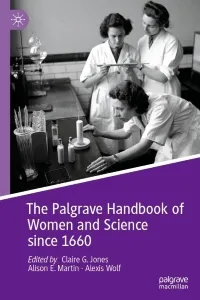
The Palgrave Handbook of Women and Science Since 1660 edited by Claire G. Jones, Alison E. Martin, and Alexis Wolf (2022) (requires login)
"While the handbook’s primary focus is on women's experiences, chapters also reflect more broadly on gender, including issues of femininity and masculinity as related to scientific practice and representation. Spanning the period from the birth of modern science in the late seventeenth century to current challenges facing women in STEM, it takes a thematic and comparative approach to unpack the central issues relating to women in science across different regions and cultures."
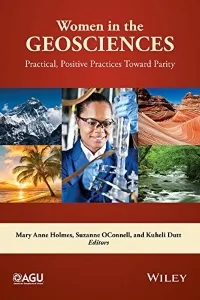
Women in the Geosciences: Practical, Positive Practices Toward Parity edited by Mary Anne Holmes, Suzanne OConnell, and Kuheli Dutt (2015)
"The geoscience workforce has a lower proportion of women compared to the general population of the United States and compared to many other STEM fields. This volume explores issues pertaining to gender parity in the geosciences, and sheds light on some of the best practices that increase participation by women and promote parity."
Suggested Videos
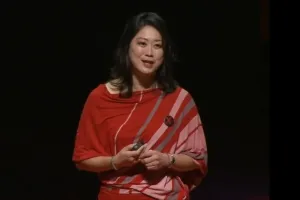
An Engineering Approach to Foster Women in STEM by Sierin Lim (2020)
"Several studies, statistical analyses and even general observations highlight the fact that the number of women in the fields of science, technology, engineering and mathematics (STEM), is relatively lower than that of their male counterparts; the troubling ratio being consistent across the globe. In such a scenario, the need to identify the root causes behind the poor participation and presence of females in STEM is of paramount importance, and one that needs addressing at the earliest, if we, as a society, are to create and sustain a world with gender-equal possibilities and opportunities."
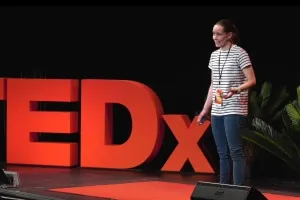
We Need More STEM Role Models Who Are A Bit Less Brilliant by Sarah Chapman (2022)
"Sarah passionately believes and sees in her work, that good ideas can come from anyone, anywhere - whatever their gender, race, age, sexuality, abilities, or background. In her talk, she shares why there has never been a better time to encourage more women, girls, and underrepresented minorities into STEM."
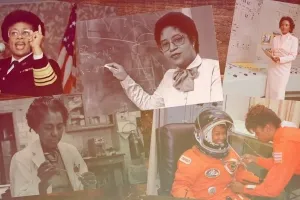
The Hidden Women of STEM by Alexis Scott (2018)
"Did you know some extraordinary women in Science, Technology, Engineering and Math feel invisible in their fields? This Talk explores what it means to be a female hidden figure in STEM and what one can do to change it."